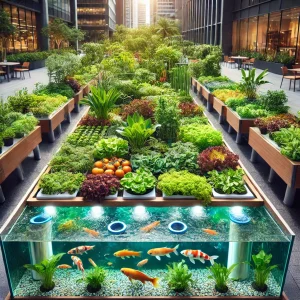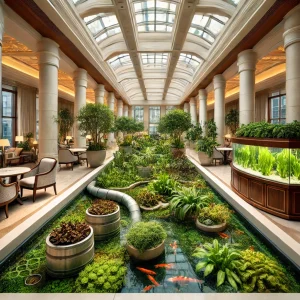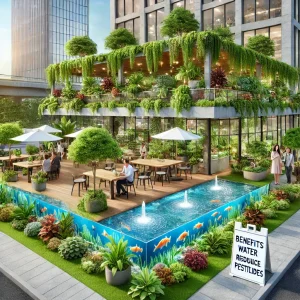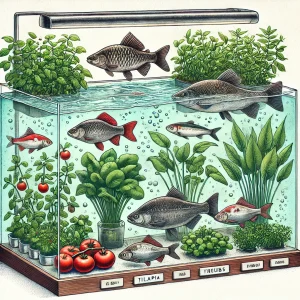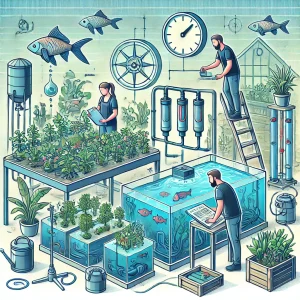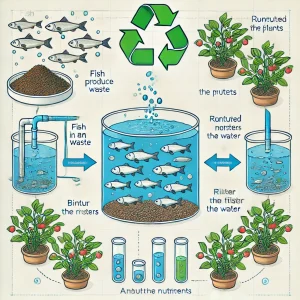Aquaponic gardens offer an innovative approach to commercial landscaping by merging fish farming with plant cultivation. This symbiotic system presents numerous benefits for businesses, enhancing aesthetic appeal and sustainability. In this blog, we will explore the principles of aquaponics, the advantages for commercial landscapes, real-world applications, challenges, and future trends. Additionally, we’ll provide examples and case studies to illustrate the success of aquaponic gardens.
Principles of Aquaponics
Aquaponics is a sustainable farming method that combines aquaculture (raising fish) with hydroponics (growing plants in water). In this system, fish waste provides essential nutrients for plant growth. The plants, in turn, filter and clean the water, which is then recirculated back to the fish tanks. Consequently, this closed-loop system reduces the need for chemical fertilizers and minimizes water usage.
Benefits for Commercial Landscapes
Integrating aquaponics into commercial landscaping offers several benefits.
Firstly, aquaponic systems are environmentally friendly, reducing water consumption and eliminating the need for harmful pesticides and fertilizers. Furthermore, the combination of lush plant life and vibrant fish creates visually appealing landscapes that attract customers and enhance property value. While the initial setup may be costly, aquaponic systems can reduce long-term maintenance expenses and provide a sustainable produce source. Additionally, aquaponic gardens serve as educational tools, promoting awareness about sustainable practices among employees, customers, and the community.
Real-World Applications
Several businesses have successfully integrated aquaponic gardens into their landscapes. For example, the Bellagio Hotel in Las Vegas features an aquaponic system in its conservatory that supports a variety of plants and fish, creating a serene environment for guests while promoting sustainability. Similarly, Prudential Plaza in Chicago includes an aquaponic garden that supplies fresh produce to on-site restaurants, thereby reducing food miles and providing a unique dining experience.
Common Fish and Plants in Aquaponic Systems
The choice of fish and plants in aquaponic systems is crucial for maintaining balance. Due to their hardiness and fast growth rates, tilapia, trout, and catfish are commonly used fish. Popular plants, including leafy greens, herbs, and tomatoes, thrive in nutrient-rich water.
Challenges
While aquaponic gardens offer numerous benefits, they also present challenges. Installing aquaponic systems can be expensive, requiring significant investment in tanks, pumps, and other equipment. Additionally, successful management of an aquaponic system requires understanding both aquaculture and hydroponics, which may necessitate specialized training. Moreover, regular monitoring and maintenance are essential to ensure the health of both fish and plants, which can be time-consuming and labor-intensive.
Future Trends
The future of aquaponic gardens in commercial landscaping looks promising. Advancements in technology and increasing awareness of sustainable practices are driving the adoption of aquaponics. Future trends include:
Integration with Smart Systems: Using sensors and automated systems to monitor and manage water quality, temperature, and nutrient levels, making aquaponic gardens more efficient and easier to maintain. Urban Agriculture: The incorporation of aquaponic systems into urban environments, providing fresh produce in densely populated areas and transforming rooftops and unused spaces into productive gardens. Community Engagement: Businesses use aquaponic gardens to engage with their communities through workshops, tours, and educational programs, thereby promoting sustainability and healthy living.
Aquaponic gardens represent a forward-thinking approach to commercial landscaping, combining nature’s beauty with sustainability principles. By integrating fish farming with plant cultivation, businesses can create stunning, eco-friendly landscapes that benefit the environment and their bottom line. As technology advances and awareness grows, the future of aquaponic gardens in commercial spaces looks brighter than ever.
